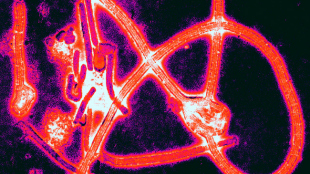 WIKIMEDIA, THOMAS GEISBERT, BOSTON UNIVERSITY SCHOOL OF MEDICINEThree separate research projects will test Ebola treatments among the human populations at the epicenter of the epidemic, according to the medical charity group Doctors Without Borders. The group announced today (November 13) that it will host the clinical trials, which are set to commence next month, at three separate sites in West Africa: in Liberia, and in Gueckedou and Conakry, two towns in Guinea.
WIKIMEDIA, THOMAS GEISBERT, BOSTON UNIVERSITY SCHOOL OF MEDICINEThree separate research projects will test Ebola treatments among the human populations at the epicenter of the epidemic, according to the medical charity group Doctors Without Borders. The group announced today (November 13) that it will host the clinical trials, which are set to commence next month, at three separate sites in West Africa: in Liberia, and in Gueckedou and Conakry, two towns in Guinea.
Researchers from the University of Oxford in the U.K. will test the effectiveness of Brincidofovir, an antiviral drug being developed by Chimerix of Durham, North Carolina, in Liberia. Ebola sufferers in Gueckedou, Guinea, will be given the Japanese antiviral Favipiravir as part of a study that will be overseen by France's National Institute of Health and Medical Research. And researchers from the Antwerp Institute of Tropical Medicine will administer the blood of Ebola survivors to patients in Conakry, Guinea.
“There’s both the humanitarian need, a tragedy for individuals and for communities and we need to do everything we can to offer some hope to those communities,” Peter Horby, an Oxford researcher who will help conduct the Liberian trial, told BBC News. “But there’s also scientific ...




















